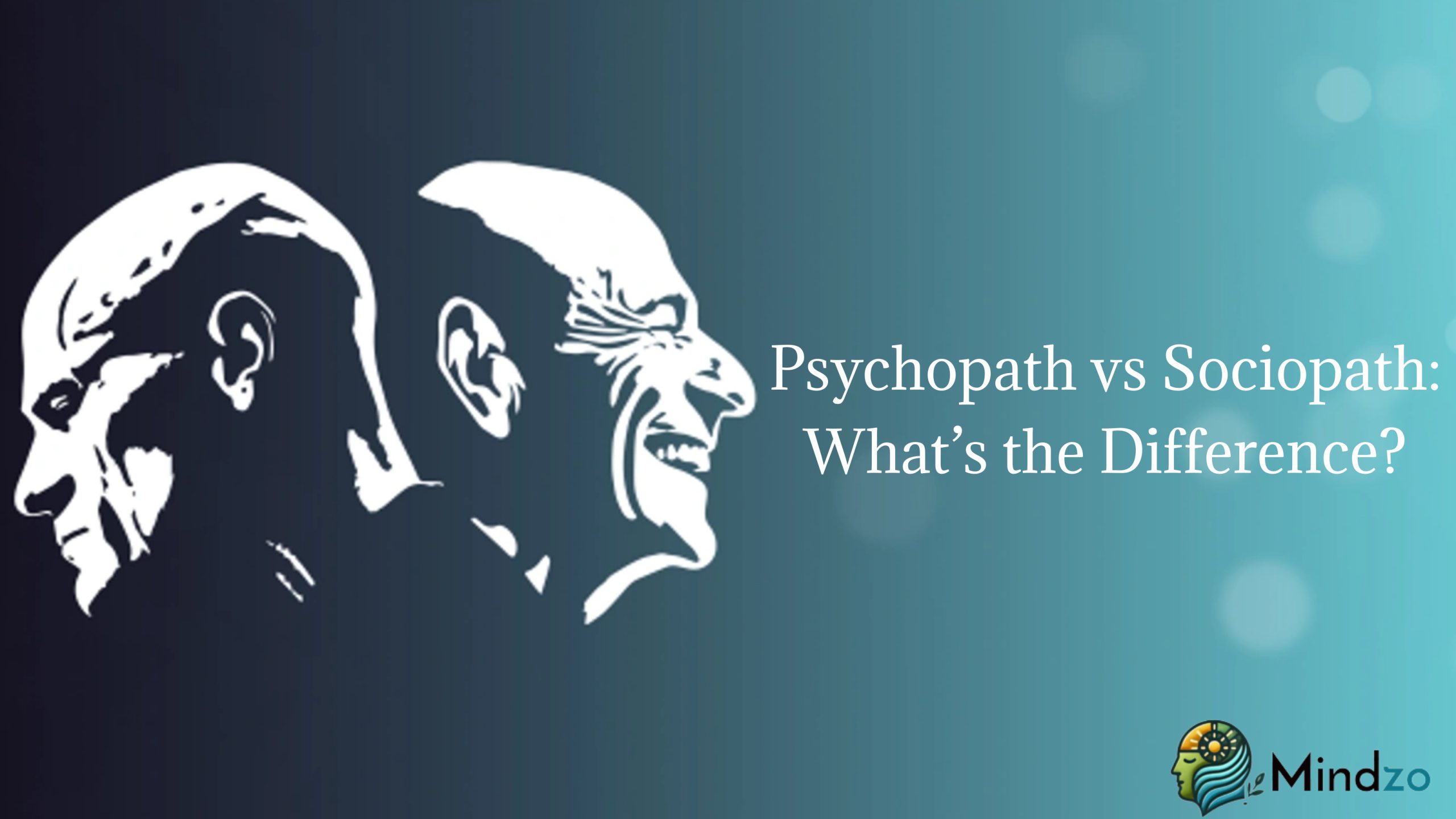Psychopath vs Sociopath: What’s the Difference?

People often use the words psychopath and sociopath to mean the same thing in crime programs, movies, and everyday life. These designations, on the other hand, stand for different types of antisocial behavior that have different sources, effects, and meanings. It is very important for mental health experts, criminal justice workers, and anybody else who wants to learn more about these complicated personality disorders to know the difference between a psychopath and a sociopath.
In clinical settings, these disorders are classified as Antisocial Personality Disorder (ASPD), yet they have distinct traits that differentiate them. This in-depth study looks at the scientific differences, behavioral patterns, and social effects of these two personality types.
Understanding Antisocial Personality Disorder
The official name for the group of qualities that includes both psychopathic and sociopathic tendencies is Antisocial Personality Disorder. The Diagnostic and Statistical Manual of Mental Disorders (DSM-5) says that ASPD is a pattern of not caring about other people’s rights that starts in childhood and goes on into adulthood.
People with ASPD often lie, manipulate, act on impulse, be aggressive, do things without thinking, and not feel bad about what they do. Psychopathy and sociopathy, on the other hand, are two different forms of this wide group, each with its own signs and causes.
Psychopathy: The Predatory Calculated
Psychopathic features are thought to originate mostly from hereditary and neurological influences, resulting in persons who seem attractive and composed while possessing significant emotional deficiencies.
Key Traits of Psychopathy
Psychopathy is characterized by emotional deficiencies. These people show:
Limited empathy and shallow emotional experiences
Superficial charm and charisma that hides a lack of compassion
A big sense of self-worth and entitlement
Lying and manipulating others for selfish advantage
Not feeling real shame or guilt after doing something bad
Psychopathy is characterized by certain behavioral characteristics, such as:
Actions that were planned and thought out ahead of time, not impulsive ones
Being able to keep up with relationships and jobs that look typical
Good at copying the right emotional responses
Tendency to see other people as things to be used
Criminal conduct that is frequently systematic and premeditated
The Psychopathic Brain Neuroscience research shows that psychopathic brains have different structures and functions. Neuroimaging studies reveal diminished activity in the amygdala (responsible for emotion processing) and the prefrontal cortex (associated with moral reasoning), elucidating the typical emotional deficiencies and suboptimal decision-making despite cognitive awareness of consequences.
Genetic factors significantly contribute to the development of psychopathy, with research indicating heritable components that affect brain structure and neurotransmitter function. This biological foundation elucidates the early emergence of psychopathic features and their relative stability during development.
Sociopathy: The Chaotic Reactor
Sociopathic conduct often stems from environmental influences, especially childhood trauma, abuse, or significant neglect, which result in disturbed attachment patterns and emotional dysregulation.
Key Traits of Sociopathy
Sociopathy is marked by emotional instability:
Strong but unstable feelings and relationships
Ability to form attachments to certain people or organizations
Anger that comes on quickly and explodes
Anxiety and restlessness when dealing with other people
Struggling to keep steady jobs or relationships
Some common behaviors in sociopathy are:
Impulsive and unpredictable actions caused by feelings
It’s hard to plan forward or think about what will happen in the future.
Building strong but fragile relationships
Criminal action that is often random and based on chance
Social isolation stemming from the inability to sustain stable relationships.
The Environmental Causes of Sociopathy
Childhood trauma is a significant factor in the development of sociopathy. Severe abuse, neglect, or exposure to violence can interfere with typical brain development and the building of attachments, resulting in individuals who experience difficulties in emotional control and social connectivity.
Attachment issues often contribute to sociopathic conduct, as early disruptions in caregiver relationships hinder the formation of appropriate social connections and emotional processing skills.
Important Differences Between a Psychopath and a Sociopath
Ability to Feel and Show Emotions
Psychopaths have very little feelings, especially when it comes to empathy and attachment. Their emotional responses are superficial and frequently contrived rather than authentic.
Sociopaths feel strong emotions, but they have trouble controlling them in the right way. They can make connections, but these partnerships are usually fragile and unpredictable.
Planning and controlling your impulses
Planning and meticulous manipulation are two things that make psychopathic behavior stand out. These people can put off getting what they want and strive for long-term goals, even if those goals are bad for them.
People with sociopathic behavior tend to act on impulse and react to things without thinking about the long term. This impulsiveness typically leads to more evident illegal behavior that is simpler to find.
Functioning in society
People with psychopathy often seem to be doing well in society, keeping jobs, relationships, and social status while secretly doing things that are damaging or manipulative. It’s hard to tell who they are because they seem normal and charming.
Sociopaths have trouble functioning in society on a regular basis, which can lead to job instability, relationship troubles, and social isolation because of their emotional instability and unpredictable conduct.
Patterns of Criminal Behavior
Crimes committed by psychopaths are usually planned, organized, and well-hidden. These people often go undetected for long periods of time because they are good at planning and hiding in plain sight.
People who commit sociopathic crimes are more prone to act on impulse, be disorganized, and be driven by their feelings. Because of how chaotic their behavior is, law enforcement frequently catches them faster.
How often it is and who it affects
Psychopathy affects about 1% of the population, according to mental health data. It’s harder to figure out how many people have sociopathy because the diagnosis is more complicated. There are more cases of these disorders in men than in women, but the way they show up may be different for each sex.
Cultural influences affect how antisocial behaviors are expressed and perceived, since certain communities exhibit greater tolerance for specific manipulative or violent qualities compared to others.
Difficulties and Methods of Treatment
Treating psychopathy is very hard because the disorder has a neurological base. Conventional therapeutic methods frequently fail, as psychopaths can exploit therapeutic connections without authentic transformation.
Sociopathy treatment holds greater potential as the illness frequently arises from environmental issues that may be effectively addressed through therapy. Some people may learn healthy ways to deal with stress through trauma-informed treatment, attachment-focused therapy, and skills for controlling their emotions.
Therapeutic approaches that exhibit moderate efficacy comprise:
Cognitive-behavioral methods concentrating on altering behavior
Training to help you control your emotions and get along with others
Structured settings that always have the same consequences
Programs for long-term intense therapy
The effect on society and public safety
Understanding antisocial personality disorders is crucial for the criminal justice system, workplace safety, and public policy. Correct identification can help with risk assessment, treatment planning, and management methods.
Risk assessment techniques assist professionals figure out how likely someone is to commit violence or go back to jail, but it’s still hard to make predictions because human behavior and environmental influences are so complicated.
False beliefs and myths
Popular culture frequently mischaracterizes psychopaths and sociopaths, fostering detrimental perceptions that do not accurately match clinical reality. Not all people with these conditions are violent criminals; many live in society without committing crimes.
Media representations often amplify the frequency and traits of these diseases, resulting in public misconceptions and the stigmatization of mental health issues in a broader context.
Understanding Intricate Human Conduct
The difference between psychopathy and sociopathy shows how genetics, neurology, and the environment all work together to shape how people act. Although both illnesses entail antisocial behavior and a lack of regard for the rights of others, their divergent origins and manifestations necessitate unique strategies for comprehension, evaluation, and management.
Recognizing these disparities helps mental health experts create more effective treatments, helps people in the criminal justice system make better decisions, and helps society better understand the causes of antisocial conduct. As study progresses, our comprehension of these intricate illnesses will inevitably advance, maybe resulting in enhanced preventative and therapy methodologies.
Most importantly, learning about antisocial personality disorders reminds us that people’s conduct falls on a spectrum and is affected by a wide range of biological, psychological, and social factors that affect how they interact with the world around them.
References:
Vocal.media
-
 Beyond Words: The Emotional Medicine of a Simple HugOctober 27, 2025
Beyond Words: The Emotional Medicine of a Simple HugOctober 27, 2025 -
 Music’s Unique Therapeutic BenefitsOctober 23, 2025
Music’s Unique Therapeutic BenefitsOctober 23, 2025

Leave a Reply